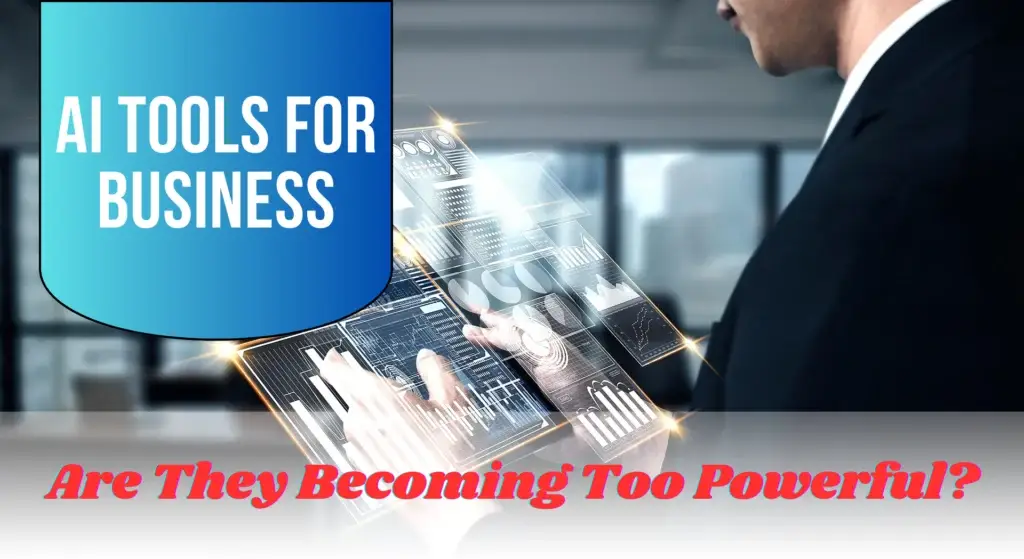In 2024 alone, more than 70% of global businesses adopted at least one AI-powered tool to enhance their operations. From automating customer service to generating high-converting ad copy, artificial intelligence has moved from buzzword to business essential. But as these tools become smarter and more deeply integrated, a new question arises:
Are AI tools becoming too powerful for business?
This article dives into the transformative power of AI, the hidden risks that come with unchecked adoption, and how businesses can strike a responsible balance.
How AI Tools Are Empowering Modern Businesses
AI is not just helping businesses—it’s redefining how they operate.
Tools like ChatGPT handle customer queries 24/7, while Jasper generates marketing copy at scale. Midjourney and DALL·E empower teams to produce studio-quality visuals without a designer, and Copy.ai automates personalized outreach at lightning speed.
Key Benefits of AI Tools for Business:
-
Increased efficiency: AI can execute tasks in seconds that once took hours.
-
Cost savings: Reduced need for large teams or outsourced tasks.
-
Data-driven insights: AI analyzes patterns that humans might miss.
-
Scalability: Handle thousands of customers or products effortlessly.
According to a McKinsey report, companies that integrate AI deeply into their processes can increase productivity by 20–40%.
The Dark Side of AI: When Tools Become Too Powerful
With great power comes… a long list of concerns.
While AI brings speed and automation, it can also introduce errors, bias, and ethical challenges—especially when left unchecked.
Risks of Overpowered AI in Business:
-
Autonomous decisions without context: AI may make decisions that lack human nuance or empathy.
-
Misinformation from “hallucinating” tools: AI sometimes generates plausible-sounding but false information.
-
Opaque black-box behavior: Many AI models are too complex to fully understand, even by their creators.
-
Algorithmic bias: Trained on flawed data, AI can perpetuate and scale discrimination.
Expert Quote:
“Just because AI can make decisions doesn’t mean it should.” – Kate Crawford, AI Ethics Researcher
Real-World Case Studies — The Good, The Bad, and The Alarming
The Good: Shopify’s AI-Powered Assistant
Shopify uses AI to help sellers write product descriptions, respond to customer queries, and recommend pricing—all increasing efficiency and conversion rates.
The Bad: AI in Recruitment
Amazon famously scrapped its AI hiring tool after it was found to favor male candidates, having been trained on a dataset skewed toward past male hires.
The Alarming: Deepfake CEO Voice Scam
In 2023, a deepfake voice of a CEO tricked an employee into transferring $243,000 to fraudsters. As generative AI evolves, so do the threats.
What Businesses Risk by Giving AI Too Much Control
Here’s what could go wrong when businesses blindly hand over the reins to AI:
-
Job displacement: Replacing human roles without reskilling strategies widens the unemployment gap.
-
Loss of human creativity: Over-reliance on AI may diminish authentic innovation.
-
Data privacy violations: AI tools often collect and analyze user data—sometimes without proper compliance.
-
Reputational risk: AI missteps can result in PR disasters or legal trouble.
A PwC survey found that 67% of executives believe AI implementation must come with strict governance, or they risk long-term damage.
Responsible AI Adoption: Finding the Right Balance
AI isn’t inherently dangerous. It’s how we use it that matters.
Tips for Smart AI Integration:
-
Keep humans in the loop: Use AI to assist, not replace, critical decisions.
-
Audit your tools: Regularly review performance, biases, and compliance.
-
Create AI ethics policies: Establish rules for acceptable use in your organization.
-
Educate your team: Ensure employees understand how AI tools work—and their limitations.
Tip: Choose transparent AI platforms that let you view how decisions are made (a.k.a. explainable AI).
The Future of AI in Business — Friend or Foe?
In the next five years, AI will likely become more powerful, more accessible, and more regulated.
We’ll see:
-
Personalized AI assistants for every employee
-
Stricter global AI laws (like the EU AI Act)
-
Demand for AI-literate teams
-
Collaborative workflows between humans and machines
The businesses that thrive will be those who embrace AI strategically, ethically, and transparently.
Conclusion: Use AI, Don’t Be Used By It
AI tools are revolutionizing business—but unchecked power can lead to unintended consequences. The key isn’t to fear AI—it’s to understand it, respect its limits, and set ethical boundaries.
Final thought:
In the future, the most successful businesses won’t be the most automated—they’ll be the most balanced.
Frequently Asked Questions About AI Tools for Business
What are AI tools for business?
AI tools for business are software applications that use artificial intelligence and machine learning to automate tasks, analyze data, assist with decision-making, and improve overall business operations. Examples include AI chatbots, content generation tools, predictive analytics software, and intelligent CRM systems.
How can AI tools for business improve efficiency?
AI tools for business can automate repetitive tasks, provide faster customer support, generate marketing content, and analyze large datasets to uncover insights. This helps businesses save time, cut costs, and make smarter decisions based on real-time data.
Are AI tools for business safe to use?
Most AI tools for business are designed with security in mind, but risks like data privacy breaches, biased algorithms, and decision-making errors exist. It’s important for companies to use trusted AI vendors, set clear governance policies, and regularly audit their AI systems.
Can AI tools for business replace human jobs?
AI tools for business are increasingly capable of automating certain jobs, especially repetitive or data-driven tasks. However, they also create new opportunities by enabling workers to focus on creative, strategic, and relationship-driven roles that AI cannot easily replicate.
What are the best practices for using AI tools for business?
The best practices include keeping humans involved in decision-making, ensuring data privacy, using ethical AI platforms, providing AI literacy training to employees, and maintaining transparency about how AI tools are being used.
You May Also Like: How to Write SEO-Optimized Blog Posts Using GetGenie.ai

